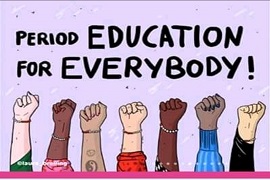Yes, it is indeed time for action. Menstrual Hygiene Day (MH Day) has been celebrated every year since May 28, 2014 all over the world. The need for the recognition of this day was as a result of the acknowledgement that women and girls in some parts of the world go through dreadful situations and are not able to live their menstruation periods in proper hygiene and dignity, for an occurrence so natural that every woman has to experience this for a large part of her life. Celebrating MH Day creates awareness and is aimed mainly at breaking stereotypes and taboos surrounding menstruation or periods. It has been a challenge for young girls especially in developing countries to cope with periods coupled with the stigma and ancient beliefs surrounding this natural and unstoppable circumstance.
Despite the pandemic which has disrupted our lives and even slowed down our economies, we still celebrate MH Day. Periods do not stop for young girls and women and definitely not because of a pandemic. Instead, it serves to create challenges for some who already had difficulties accessing proper hygiene products for their periods. This Pandemic is affecting the whole world and there is a very great tendency that other important issues will be neglected, and all efforts advanced towards the management and end of the pandemic. While this is not inherently problematic and we at SODEI support the efforts of all those involved in making our world safe again, we will not neglect issues which are important to us and our mission.
For this year’s celebration of MH Day, we want to illustrate the link between Menstrual Hygiene and The SDGs.
Menstruation is normal vaginal bleeding which occurs as part of a woman’s monthly cycle. Unfortunately, stereotypes regarding this perfectly natural happening, as observed in most societies evoke attitudes of intolerance, notions of uncleanliness and treatments of shame associated to the experience of Menstruation which is an important aspect of women’s health. It is often said that “Health is wealth”, and it goes without saying that women’s menstruation under hygienic conditions is an essential condition for their development and good health. (SDG 3)
Ensuring healthy menstruation conditions definitely contributes to healthy, productive girls in a progressive society. When girls are comfortable during their periods, they are free from the inhibitions and constraints of fearing judgement. They can rise above the biases and be more productive thereby positively impacting their society. (SDGs 4 and 5)
Healthy menstrual hygiene = quality education. Due to lack of access to appropriate feminine hygiene products causes some women and girls have to be absent from work/school which directly or indirectly affects economic growth. Consequently, the gender inequality gap is widened and perpetuated. (SDG 5)
Healthy menstrual hygiene = good health and well-being. The availability of good quality menstrual products prevents urinary tract infections, painful periods, itches among others. Thereby ensuring the right to health for young girls and women. (SDGs 1, 3 and 6)
Healthy menstruation practices equally highlight the need to ensure access to clean water and sanitation. Educating women on healthy menstrual hygiene provides useful information on the disposal of used sanitary pads which in turn educates on the need to keep water bodies and other surroundings clean and safe. As a result, we will have sustainable cities, the preservation of life on land and responsible resource consumption will be encouraged. (SDGs 6 and 11)
The importance of observing a healthy and objective attitude towards menstruation cannot be overstressed. As a society, we have to move forward by dropping the perspectives which no longer serve us. Every young girl deserves to grow free from the preconceived notions surrounding a natural phenomenon such as menstruation. It is time for action.
#MHD2020 #ItsTimeForAction




